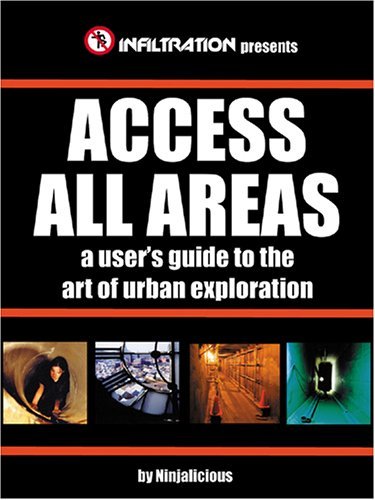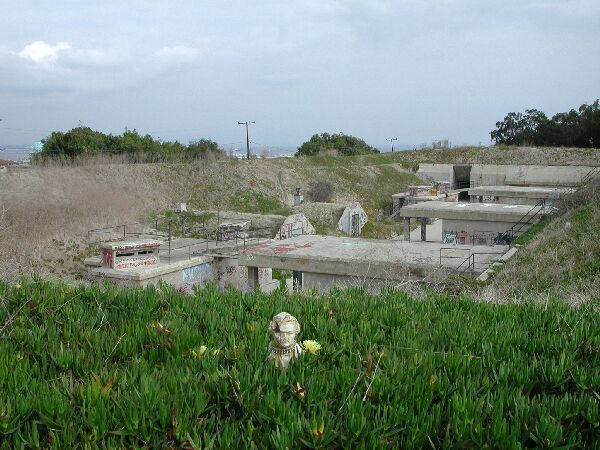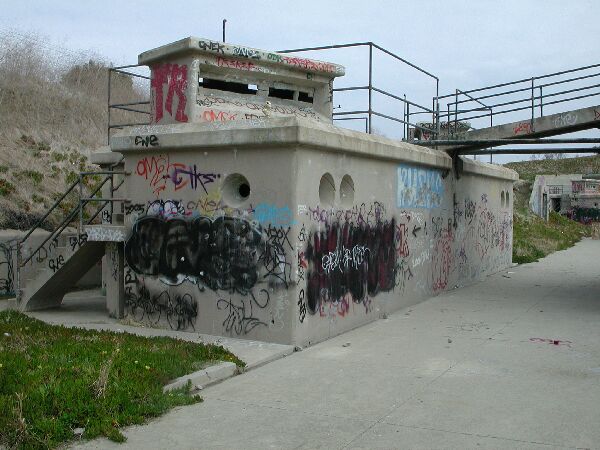Access All Areas
Ninjalicious, (2005)
[As a longtime reader of Infiltration, I was shocked at Burning Man 2005 to discover two things: its editor, Ninjalicious, was married to Liz, someone I've known since the Unlucky Lucky Car Debacle, and that Ninjalicious had died the month before. He left behind his just-completed Access All Areas as his legacy.]
When someone in Toronto says they're at the northeast corner of Yonge and Bloor, they're being imprecise. There are lots of places to be at that corner, including 35 storeys up on the roof of the Hudson's Bay Centre; at various abandoned floors or mechanical rooms within the tower; inside the tower's elevator shafts; in the pedestrian walkway under the street; at the abandoned movie theatres or the abandoned nightclub in the building's basement; in the mazes of service corridors, steam tunnels and storage rooms in the various subbasements; inside the small man-made cave accessed through those service corridors; in the subway tunnels, mechanical rooms and ventilation shafts under that; or in the storm drain, sewers and water tunnels under that. Oh, I suppose being at street level is also a possibility, though certainly the least interesting one. [74-5]
So wrote Ninjalicious: the late, legendary pioneer of urban exploration, founder of the zine Infiltration, and coiner of the very term urban exploration [232].

Originally called hacking, urban exploration began at MIT [230, 231], where hacking has at least two other meanings (pranking and computer hacking). It does share something of the ethical background of exploratory hacking and the benign form of computer hacking. As with both malicious and non-malicious forms of the latter, social engineering is a valued skill, as is (in non-malicious hacking) the idea of an unconventional tourism. Ninjalicious refers to urban explorers as "interior tourists" [135] and speaks of "beta testing" a new site [153]
Urban explorers pop into the news from time to time. Russian urban explorer Vadim Mikhailov [236] led authorities into the Moscow Theatre via an underground route (after which, authorities promptly botched the rescue, causing the death of 90 hostages by gas.) And you may have heard of the legal woes suffered by tENTATIVELY aCONVENIENCE after the Poop and Pee Dog train tunnel shenanigans (recounted on the tape The Inner Scoop of the Poop and Pee Dog Copyright Violation Ceremony). But what urban exploration ultimately aims at is a type of mind expansion, in the form of finding things most people wouldn't think to look for and don't realize they should savor even when they stumble upon them accidentally:
For too many people, urban living consists of mindless travel between work, shopping and home, oblivious to the countless wonders a city offers. Most people think the only things worth looking at in our cities and towns are those safe and sanitized attractions that require an admission fee. Their alertness has atrophied due to the lack of any real adventure in their lives, and their senses have dulled to cope with the cacophony of noise and meaningless spectacle that surrounds them. It's no wonder people feel unfulfilled and uninvolved as they are corralled through the maze of velvet ropes on their way out through the gift shop. Rather than passively consuming entertainment, urban explorers strive to actually create authentic experiences by making discoveries that allow them to participate in the secret workings of cities and structures, and to appreciate fantastic, obscure spaces that might otherwise go completely neglected. [3]

World War Two anti-aircraft installation
Part of finding exploration sites involves casting off a certain restrained mindset, in the manner of the protagonists of movies like They Live, The Matrix, and Fight Club, and realizing that many of your boundaries are self-imposed, voluntary and, ultimately, illusory. Fish farmers—who, incidentally, have not yet been the focus of a single major motion picture—occasionally employ a clever trick to keep their stock penned up. They corral their fish into a certain section of the ocean and then surround the area with a curtain of air bubbles being released in a steady stream from a perforated tube or hose at the bottom of the corral. The fish perceive the air bubbles as a solid wall and believe they are helplessly penned in, though in reality no barrier stands in their way except a thin strand of colourless gas. The only thing stopping the fish from swimming to freedom and exploring all the infinite wonders of the ocean is a simple problem of limited perception. It's the same with people. Many people think urban exploration is about bravely or foolishly defying "do not enter" and "no trespassing" signs, but in actuality most of the signs that keep people away from interesting places are much more subtle—a door that just looks like it's for employees only, for example, or a hole that you're probably not supposed to climb down into. A lot of people equate the absence of a sign saying "sale" or "admission prices" with the presence of a sign saying "keep out." But these aren't real barricades—they're just air bubbles. (Incidentally, this is an important lesson in perception that you can take from urban exploration and apply to all of your everyday affairs: you set your own boundaries, and can expand them as you see fit.) [75-6]
If you continually stretch the boundaries of your comfort zone by doing things that make you a little nervous and a little uneasy, you'll gradually expand the range of activities with which you feel comfortable. [7]
What the people who say urban exploration is wrong and bad because it's dangerous really mean is that it's wrong and bad because it's dangerous and they didn't get permission. This is a weird way to think. [6-7]
Most urban exploration takes place outside the law. This is not to say that urban explorers are necessarily outlaws; Ninjalicious outlines some of the strong ethical considerations of the thoughtful urban explorer:
Beyond the "do not enter" signs and outside the protected zone, you and your friends are free to behave as you really are, and you don't want to disappoint yourselves. When you're considering potential exploratory partners, try to enlist people who you know have firm consciences. Keep in mind that these people will not necessarily be your traditional goody-goodies; a lot of people who usually behave well do so because they're mindlessly obeying rules and laws, not because they're carefully considering which actions are helpful and right and which are harmful and wrong. People who think laws are more important than ethics are exactly the sorts who will wander into an abandoned area and be so confused by their sudden freedom and lack of supervision that they'll start breaking windows and urinating on the floor. Law-free zone, right? That means they can do anything they feel like, right?
Wrong, of course, which is why it's important to seek out people with positive ethics, who will show respect for sites by not breaking anything, taking anything, defacing anything or even littering while exploring. From what I've seen, people who don't use the law as a substitute for their own moral compass tend to develop stronger consciences and greater self-discipline simply through greater use. [19-20]
My general practice, which I would recommend to any explorer, is not to lie any more than you have to, even when it would be entirely legal to do so. This has some practical benefits, but mostly I suggest this just because I think it's lousy behaviour to abuse someone's trust. Yes, it curtails your freedom of action a little, but hey, that whole placing-ethics-above-laws dealie has to go both ways. (But, you ask, is there a real ethical difference between directly lying to people and merely deceiving them? Personally I think lying's considerably nastier than misleading, since it takes advantage of people's trust rather than people's assumptions, but I'll leave you to consider the issue for yourself.) [42]

Not the first on the moon
Some magicians claim that good magicians never share their tricks. This is nonsense. Those who don't share can spend their lives feeling very proud of their five or six selfishly hoarded secrets, but those who do share will be shared with and will come out far ahead. . . . Sharing a hint or two—or, even better, a warning or two—about a particular area or building with other explorers either online or in print is great, but please don't give away specific entrances or access points except perhaps to illustrate a general principle. Most explorers enjoy the challenge of finding a place and figuring out their own way in and don't like too much handholding. (Those who want step-by-step directions are the ones to watch out for.) [213]
I should have followed that advice right off the bat with seekers of the Mojave Phone Booth. Sure, it's possible that someone might have gotten lost or even died, but by initially giving directions, I may have made that more likely, rather than less. Anyway, danger is often a necessary part of adventure, something Ninjalicious well understood:
It must be stressed that transit tunnels, at least ones that are still in use, are among the most dangerous locations you can possibly choose to explore, from a living-and-dying perspective. If you want to do a lot of things with your life, do the other things first. I'm serious—you can go into a subway tunnel alive and come out dead. [181]
Not that he isn't sanguine about the prospects:
(Admittedly, 30 deaths a year is probably a small percentage when you consider how many thousands of people venture into mines each year, but 30 is still a lot of people, especially if they were all nice.) [210]
Probably more dangerous than natural threats are official ones:
The punishments for entering transit tunnels are very severe, especially since 11 September 2001, and often go far beyond $500 fines and all the way to jail time or worse. . . . Use your common sense and don't explore in locations where tensions are high. (Unfortunately, at the time of this writing, this warning encompasses the entire US, but perhaps this will change in the future.) [183]
Indeed, he refers to the period following the WTC destruction as:
"a two-year dark age of urban exploration." [235]
So why take the risks of urban exploration? Because:
Abandoned sites provide the best and most interactive museums of industrial archaeology and local history you'll ever find. Those building that haven't been stripped bare often house incredible old machines or technology we've all but forgotten today. And it's one thing to read about how psychiatric patients were treated, but quite another to find the records of their electroshock therapy sessions and read their reactions and see their drawings on the walls. [88]
And also:
The experience of exploring an unlit, long-abandoned, strongly tilting, partially flooded, pirate-ship-turned-restaurant is eerie and wonderful. [202-3]
+=+=+=+=+=+=+=+=+=+=+=+=+=+=+=+=+=+=+=+=+=

Buy this book directly from Infiltration.org
+=+=+=+=+=+=+=+=+=+=+=+=+=+=+=+=+=+=+=+=+=
Access All Areas is an encyclopedia of practical tips. Some of my favorites:
Try sticking a board between the links in a chain link fence to make an improvised step. [12]
[Y]ou really don't need to tiptoe down a hallway unless... well, actually, you never need to tiptoe down a hallway. Tiptoeing is a scam invented by security forces so they'd be able to spot potential troublemakers more easily. You can walk quietly without making yourself look like a complete freak. . . . It's quite possible to walk quietly and stealthily without behaving in such a way that you might as well be wearing a bright yellow shirt that says SKULKER. [23, 25]
Psychological research has demonstrated that having a cheerful facial expression will actually help you feel happy; you wouldn't think emotions would flow from your face to your brain, but it turns out they do, so that shows what you know. [33]
Being noticed trying doors, climbing ladders or entering or exiting sensitive areas can lead to calls to the security department. [136]
(Ken Nordine told me he was a compulsive doorknob turner, which once got him into Disneyland's secret tunnels then kicked out of Disneyland.)
If things aren't busy enough and you think your bluff is likely to be called, check your coat as described above and then keep a steady pace as you approach the entrance, making it clear that you don't intend to stop and check in, and as you pass by smile warmly at the person and say "hello again." [145]
On "Be-Right-Back Props, obtained from thrift stores:
If you leave your jacket or shopping bag on your chair in the waiting room while you wander away, the receptionist will just naturally assume that you're not going far and that you'll be back in a moment, while in actuality you're long gone, having snuck down to the basement and taken the steam tunnels halfway to Mexico. [39]
A nice thing to be, if you are one, or a nice thing to bring along, if you can get one, is a girl. If you are a guy, you may want to ask a member of the fairer sex to come along with you when you explore inhabited buildings, particularly places like churches and hotels. Except in a few scenarios—such as at construction sites, or in monasteries—women generally come under much less suspicion than men, since it's a well documented fact that girls are made of sugar and spice and everything nice. Who would risk getting mud on that? For most people, the idea of a woman deliberately going somewhere she's not supposed to be just doesn't make any sense. Capitalize on this ignorance! [16]
People are lazy and slow so, in most cases, lines like "Sorry, well, I guess I have to go now... I know the way out" or "I guess you have to ask me to leave now" work wonders. (Start nodding yes as you make your suggestion. Nodding, like yawning, is subconsciously catching.) [50]

Babs urbanly explores, urbanely
With shirts and coats, you should favour dark blue, dark green or dark brown over black. Dark colours look black in the dark, but don't arouse suspicion in the light. Besides, they really bring out the colours in your eyes. I mean that. [56]
Don't listen if [the cops] say that you'll make things easier for everyone if you just consent to a warrantless search; you'll really only make things easier for them. Refusing to consent to a warrantless search is not only in the best long-term interests of society as a whole, but it can also benefit you in the short term, since any potential evidence the officers subsequently turn up on you or in your vehicle may be legally inadmissible. [73-4]
We arrived at the hotel's front doors too deep in conversation to acknowledge the doorman as we strolled into the busy lobby. [103]
(That also works well with panhandlers & street preachers.)
Fire alarm annunciator panels often provide very tempting menus of venues located within particular buildings. Normally located either just inside a main entrance, by a security desk in the lobby or in an engineering area, these light-up panels labelled with the names of various areas within the building are commonly used to help firefighters find the exact location of a problem. They can also be used as "to-discover" lists by explorers, since secret places that don't make it into the official maps and tour guides, like "west steam tunnels", "second level subbasement" or "north tower attic," often have lights and labels all to themselves. [137]
Another nice trick most older and some newer elevators will let you get away with is going into express operation. To do this, simply hold down the number of the floor you wish to go to at the same time as you hold down the "door close" button. If it works, the elevator will take you there expressly, not stopping to let anyone else—such as a nosy employee—join you. [142]
If you're just trying to determine whether security ever visits a particular portion of the site, leaving a few quarters on the ground and casually checking on them every now and then is a good way to find out. [78]
Keep your eyes peeled for tall brick smokestacks, as there's often something quite wonderful at the bottom of those. [93]
In places, Ninjalicious serves as almost a Sun Tzu for urban explorers. Here are some aphoristic samples:
Five relaxed people are a hell of a lot more likely to run into trouble than two nervous people. [8]
Acting is a more important skill than lying; if you can act out the little things correctly you won't be placed in a situation where you need to lie. [134]
Anything really big is worth exploring, because really big stuff is cool. [155]
I love looking at old buildings with old people, because they match, and older people often have great stories and a wonderful appreciation for the way places used to be. [17]
Every change offers new possible ways to solve the puzzle. [157]
You may have heard before that the Chinese word for "change" is the same as the Chinese word for "opportunity." Personally I think the Chinese have the right idea and that we should replace the English words "change" and "opportunity" with the much catchier word "changeportunity", but I haven't been able to get the people at the Oxford English Dictionary to write me back. [156]
Opportunity is fickle, jealous and immature; if you hurt its feelings by not paying it enough attention it will soon stop speaking to you altogether. In spite of its personality problems, opportunity is a very good friend to have, so remember to demonstrate how happy you are to see it whenever it shows up, even if you're dressed all wrong and the timing is terrible. If you're walking down the street and some guy wearing a hard helmet comes out of an unmarked door on the side of an unmarked building, smile at him, grab the door and walk through. . . . [W]hat if . . . you find a long metal ladder leading up the inside of a tower, or a damp cement staircase leading down into the darkness? It happens—mostly to people who seize the door. [158]
Carpe something or other! So let's finish with a sentence describing one of the more satisfying experiences an urban explorer can have:
"The guard at the front door scarcely glanced at us on our way out." [152]
+=+=+=+=+=+=+=+=+=+=+=+=+=+=+=+=+=+=+=+=+=
And once again, I say also:
Buy this book—TODAY—directly from Infiltration.org

[See also: "Is This The Way To Baker House?"]
|

